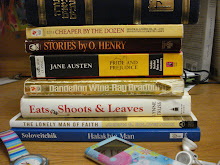WARNING: The following post lies somewhere on the border between philosophical and just depressing.
I am home for the summer, which means three months of relative social isolation and a significantly decreased level of structured activity. To many, a three month vacation sounds like bliss. But let me tell you, it is easier said than done. At risk of incurring the annoyed frustration of those not fortunate enough to have a summer break, I will attempt to explain why I have often found the past (it hasn’t even been a) week so difficult.
One obvious reason is that empty time gives ample opportunity to think about things that one would rather forget. Left without distractions, all the worries, anxieties, and hurt that you try so diligently to ignore are suddenly very present—and there is nowhere to hide.
The second reason is loneliness. Many of my friends in similar situations have complained of feeling lonely. Personally, I have suffered acutely from the same malady. Yet it seems somewhat unreasonable. Ok, so I’m not seeing people nearly as often as I did during the year when we all lived in a dorm on top of each other, but I still have friends, right? There’s always email and g-chat and the telephone—and one or two people in town who I can drive over to see every once in not-too-long-a-while. Yet alone in my room in the evening, the feeling of loneliness grows oppressive. An equivalent solitary night in the dorm would not have me feeling this way—why?
I think the answer lies in the fact that an extended absence allows me to realize how little I am needed.
I am blessed with many wonderful friends, yet how many of them do I really talk to over the summer? Which of my friends feels the need to call me, specifically me, on a consistent basis? Honestly, very few, if any. We’re in touch, but mostly because they, too, are lonely and crave human contact. It isn’t me they need. No one truly cares enough to feel that a day would be lacking without me, without my unique input and perspective.
Of course, this is perfectly normal. Very few people are that reliant on their friends. But we don’t like to remember that—and on an ordinary basis, we don’t have to. We can feel important; involved in each other’s lives every day because we see each other every day—and that is reassuring. But here, over the summer, in my dimly-lit room at night on my own, I remember that I am just one insignificant person. And that can be scary; and it can make me feel alone, in a way that irrationally whispers to my soul, "No escape."
Perhaps it isn’t such a bad thing—an occasional reminder of one’s relative unimportance is probably quite healthy. But then again, three months of the brutal truth is likely more than I need—though hopefully not more than I can handle.
Clarification: The comments on this post indicated that I wasn't totally clear about my intention and meaning; therefore, my expanded response is as follows (as copied from the comments on this post):
I never meant to intimate that close friends don’t truly care about each other—of course we do—but that is not the same as needing each other. Certainly, our lives are enhanced by our interactions, and we miss each other when we’re apart for extended periods of time. And naturally, when things happen in our lives, we want to discuss them with our friends—but in a more general sense. In other words, because I need to vent or want an outsider’s perspective, I will select one of my friends to talk to. Often, though, that choice will be dependent on who’s logged in to g-chat when I want to talk, or who is around and will be open to listening. Except in occasional specific situations, we don’t usually single out one individual as the person whose unique opinion we seek. Generally, it isn’t, “Wow, this issue just occurred to me—I’ve got to call SJ to hear what she has to say,” or “I won’t feel that I have a complete perspective on this until I’ve heard Erachet’s opinion.”
Nor do I think that it would necessarily be better in any way if this was the case. In my experience, such intense investment in a specific person primarily occurs only in romantic relationships or in a situation where one person is viewed as mentor to the other (in which case, the mentee needs the mentor, but not vice versa). However, being confronted by the reality that there is no one who relies on you to such a degree, who would find his/her life significantly less comprehensible without you, isn’t so much fun. We don’t like to remember the fact that when our friends—even close friends—are no longer in close proximity to us, we often drift apart.
Also, I did not intend to imply that I do not know how to be alone. I think it is extremely important for people to be comfortable enough with themselves to spend time alone; such time is vital for introspection and self-discovery. During the school year, I enjoy spending time on my own—reading, writing, walking, watching, and thinking—which is why I wondered what makes the summer different: why does being alone suddenly become oppressive?
This post was not about having a negative attitude. I didn’t write it merely to express my loneliness or to receive assurances from friends (though those are, of course, additional perks). I wrote it because in contemplating my distress I came to a realization about why I was feeling that way, and I thought that realization was interesting for what it reveals about human nature.


